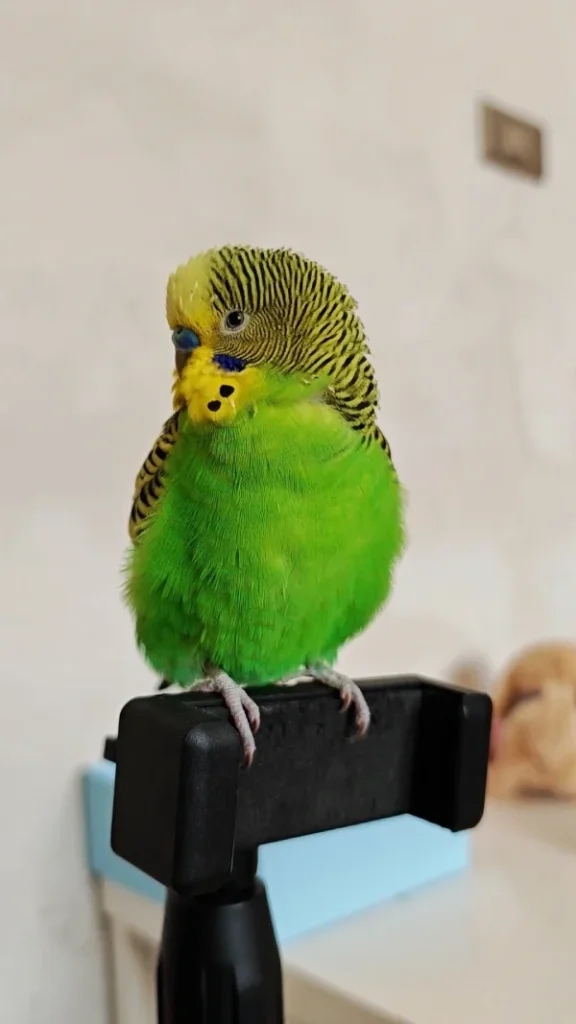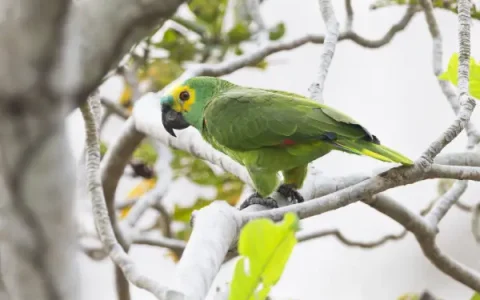Budgerigars (Melopsittacus undulatus), affectionately known as budgies or parakeets, are among the most popular pet birds worldwide. They are generally gentle, social, and curious. However, like all parrots, budgies do use their beaks not only for eating but also for communication.
This raises a common concern among new owners:
“Do budgerigars bite, and should I be worried?”
As a parrot care expert with years of experience handling budgies, I’ll explain why budgies bite, how to distinguish between playful nibbles and aggressive bites, and how to prevent and manage this behavior.

1. Do Budgerigars Really Bite?
A. Beak Use vs. Biting
- Exploratory nibbling: Budgies use their beaks to climb, test objects, and gently interact.
- Playful beak touches: They may gently grab fingers without intent to hurt.
- True bites: A strong, defensive chomp usually happens when the bird feels threatened, startled, or stressed.
B. Severity of a Budgie Bite
- Compared to larger parrots, budgie bites are relatively mild.
- They may pinch or break skin, but serious injuries are rare.
Key Point: Most “bites” are actually communication attempts, not aggression.
2. Why Do Budgerigars Bite?
A. Fear or Stress
- New or untrained budgies bite out of self-defense.
- Loud noises, sudden movements, or unfamiliar environments can trigger this.
B. Territorial Behavior
- Budgies may bite when you reach into their cage, especially during nesting or molting.
C. Lack of Taming
- Hand-shy birds that haven’t been trained may resist handling with their beak.
D. Hormonal Changes
- During breeding season, hormones can increase irritability.
E. Miscommunication
- Owners sometimes mistake playful nibbles as aggression.
3. How to Prevent Budgerigar Biting
Step 1: Build Trust
- Spend time near the cage, speaking softly.
- Allow the budgie to approach at its own pace.
Step 2: Hand-Taming
- Use treats (like millet) to encourage stepping onto your finger.
- Avoid grabbing the bird suddenly.
Step 3: Respect Boundaries
- Don’t force handling when the budgie is tired, eating, or preening.
- Limit cage intrusion during nesting.
Step 4: Socialization
- Gradual exposure to new people and environments reduces fear-based biting.
Step 5: Positive Reinforcement
- Reward calm behavior with treats and praise.
- Never punish a budgie for biting—it increases fear.
4. What to Do If Your Budgerigar Bites
- Stay calm: Reacting strongly may reinforce the behavior.
- Gently withdraw your hand without jerking.
- Redirect: Offer a toy or perch as an alternative target.
- Identify the trigger: Was it fear, intrusion, or overhandling?
Expert Tip: Consistency is key. If you respect boundaries and build trust, most budgies naturally stop biting.
5. Expert Insights & Owner Experience
- According to the Association of Avian Veterinarians (AAV), biting in budgies is usually a symptom of fear or poor socialization, not inherent aggression.
- In my own experience, hand-raised budgies rarely bite aggressively once trust is established.
- With consistent taming, most budgies become gentle companions that use their beaks only for play or climbing.
6. FAQs
Q1. Do budgerigars bite hard?
No—budgie bites are usually mild pinches compared to larger parrots. They may sting but rarely cause serious harm.
Q2. Why does my budgie bite me when I put my hand in the cage?
This is often territorial behavior. Approach slowly and use treats to create positive associations.
Q3. Are male or female budgies more likely to bite?
Both genders may bite if stressed. However, females may become more territorial during breeding season.
Q4. How do I stop my budgie from biting?
Patience, trust-building, hand-taming, and positive reinforcement are the best long-term solutions.
Q5. Is biting a sign that my budgie doesn’t like me?
Not necessarily—biting usually signals fear, discomfort, or miscommunication, not dislike.
References
- Association of Avian Veterinarians (AAV) – Budgerigar Behavior and Training
- World Parrot Trust – Budgerigar Care Profile
- RSPCA UK – Caring for Pet Budgerigars
- Avian Behavior International – Studies on parrot communication and biting
Conclusion
So, do budgerigars bite?
Yes, but usually for specific reasons like fear, territoriality, or miscommunication. Their bites are mild compared to larger parrots and often reduce with proper training.
With patience, respect, and consistent taming, most budgies become affectionate companions that rarely use their beaks aggressively.
Budgerigars are not naturally “biters”—they are simply tiny parrots learning how to communicate with us.
Article title: Do Budgerigar Bite? An Expert Guide for Pet Owners
Article link: https://www.parrot234.com/do-budgerigar-bite-an-expert-guide-for-pet-owners/
Disclaimer: The content of this site is contributed by users, compiled from the Internet, or edited by AI, so no guarantee can be made for the authenticity of the content! Please judge the authenticity of the content by yourself! However, if you find any suspected: plagiarism, infringement, illegal and irregular, suspected fraud, false and bad content, please contact this site in time through the "Contact & Suggestion" channel at the bottom. This site always maintains an active and cooperative attitude to deal with various problems, so after receiving the email, the corresponding content will be deleted!

